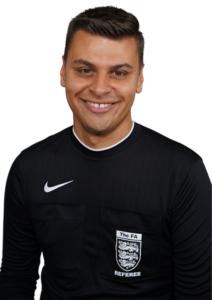Have you received an appointment to a cup final or play-off fixture and thought, “Can I referee a game of this level? Do I have what it takes? My colleagues are so much better than me”?
Even though some officials achieve a certain level, they doubt their ability to referee high stakes games. At the very foundation of confidence is the question, “Do I belong on this game?”
Sometimes, you may think it was a fluke to be handed the game, or you were lucky with marks during the season. You may dismiss your successes because you feel your colleagues just had bad games. You may view a good performance as a one off.
We have a name for those times when you feel like a fraud or lucky: the “imposter syndrome.” The imposter syndrome occurs when you doubt your successes and feel like a fake.
The impostor syndrome is the belief that you are not as competent as others perceive you to be. It’s the feeling of being not real. You think you are not talented and fear your colleagues will come to the same realisation.
Common Signs of Imposter Syndrome Include:
* Attributing your success to luck
* Frequently putting yourself down
* Fear that you won’t live up to expectations
* Sabotaging your success by putting in less preparation and effort
To counter the imposter syndrome, you can:
* Steer clear of perfectionism.
* Put in the necessary work.
* Don’t be afraid to ask your coach/referee manager for help improve your skills.
* Work on your mental game.
* Challenge your thoughts.
* Stop comparing yourself to others.
* Know that you belong and chase down new goals.
The Baseball Example
To understand this issue, let’s consider United States Major League Baseball club, Los Angeles Angels’ former outfielder Brandon Marsh.
Marsh was a second-round pick in the 2016 MLB draft. After five successful years in the lower leagues, Marsh was called up to the main league.
In 70 games with the Angels, Marsh struggled with a batting average of .254. Though he had difficulty early in the season, Marsh found his stride and hit .297, with two homers and 17 RBIs in his final 46 games.
Marsh credited his turnaround to changing his perspective and simplifying the process:
“I don’t want to feel like I’m not supposed to be here because then I’m already out. The game is already hard enough. You don’t want to make it any harder. We just have to keep it simple, don’t try to be a Superman. We have a phenomenal lineup, top to bottom, and depth, guys who are going to make the big plays, so stick to yourself, play your role, and do you.” – Brandon Marsh, Outfielder, Philadelphia Phillies
The first step to overcoming the imposter syndrome is recognising that you belong on the key fixture to which you’ve been appointed. Since you achieved a certain standard or performed at a high level over the season, you have earned your place in the officiating team for this big game.
How to Overcome Imposter Syndrome:
The first step to overcoming the imposter syndrome is awareness. If you think you might have imposter syndrome, ask yourself the following questions:
Do you attribute your success to luck or external factors?
Do you feel you will eventually be “found out”?
Are you modest regarding your skills and successes?
At The Third Team I work individually and in collaboration with different professionals where I have developed workshops and 1-2-1 sessions associated with Resilience and Mental Toughness Development to help referees. The workshops and 1-2-1 sessions are interactive, where referees are encouraged to open up and share their experiences to help themselves and each other.
Feel free to contact me if you’d like to know more about my workshops or 1-2-1 sessions and how I could help you or your officials.
Best Wishes,

Nathan Sherratt
Referee Educator & Managing Director of The Third Team

Nathan Sherratt
Nathan Sherratt, Referee Educator, Resilience Trainer and Managing Director of The Third Team. A Mental Toughness Practitioner based in County Durham, North East England.

